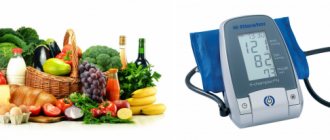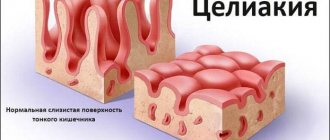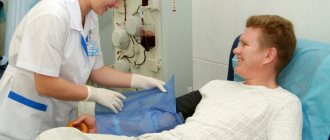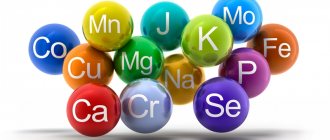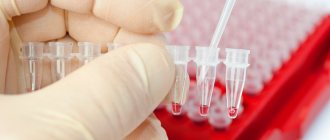Full text of the article:
Surely you have heard about iodine deficiency in the body. This is repeated not only in advertising. Doctors are also sounding the alarm. The Endocrinological Research Center of the Russian Ministry of Health publishes statistics according to which about one and a half million adults and more than half a million children in the country have thyroid diseases and need specialized endocrinological care. The cause of most thyroid diseases is iodine deficiency in the human body.
Causes of iodine deficiency in the body
The body receives vitamins and nutrients mainly through food; the food we are used to eating is not rich in iodine, so there is a risk of developing iodine deficiency. Iodine as such is difficult to detect in nature, but some plants are able to accumulate it, for example, algae, so kelp contains 150 times more iodine than any vegetable grown on earth. Seafood and sea dwellers, who obtain iodine from underwater vegetation, are rich in iodine. Fish or seafood caught in the sea themselves become good suppliers of iodine for humans. The problem is that residents of only some regions of Russia have free access to marine resources, and for them, fish and seafood are not the basis of their daily diet.
People all over the world experience iodine deficiency. Residents of modern Switzerland, for example, have suffered from severe thyroid diseases since the Middle Ages. The situation was slightly improved only at the beginning of the last century, when industry came to the aid of medicine and the production of iodized products began.
Does iodized salt help replenish iodine deficiency in the body?
The most common iodine-containing product for us is iodized salt. You can find it on the shelves of almost all grocery stores. Iodized salt is believed to help combat iodine deficiency. More than a hundred countries are fighting iodine deficiency at the legislative level, developing preventive measures. In Russia, large-scale prevention of iodine deficiency is not yet carried out, so about 70% of the population suffers from it.
In the first stages, replenishing iodine deficiency in the body is not so difficult; diet and taking medications containing potassium iodide help. You can also get some iodine from foods: fish, eggs, white meat and seaweed. 100 grams of seaweed contains two daily requirements of iodine, so with its help you can quickly replenish iodine deficiency in the body. By the way, it is recommended for an adult to take 250 mcg of iodine per day.
How to saturate the body with iodine?
The trace element iodine has been known to people for more than 200 years. During this period it was used as a disinfectant and antibacterial agent. Bottles with bright liquid were widely used by lovers of “folk” remedies for treating bronchitis, coughs, and abscesses. They used an alcohol solution as a topical application in the form of an iodine network. And only in the middle of the last century, scientists discovered a close relationship between iodine deficiency in the human body and various internal pathologies. Which included nodular changes in the thyroid gland, the development of dementia and even a decrease in the level of immunity.
Currently, there is irrefutable evidence, confirmed by practical research, that iodine is one of the most important microelements. On average, the adult human body contains a microscopic amount of this element. It does not exceed 30 mg. With higher levels, poisoning can develop, which leads to very sad consequences. The main part is contained in the tissues of the thyroid gland. This is an important organ of the endocrine system, which consists of small follicular formations filled with fluid. The production of the hormone thyroxine also occurs there. It is for this substance that iodine is required.
The sphere of influence of the hormones produced by the thyroid gland is so large that it is quite difficult to overestimate it. These are protein and fat transformations in the digestive process, regulation of the process of using carbohydrates, responsibility for preserving and maintaining normal body temperature, ensuring mental activity and much more.
With iodine deficiency, irreversible processes begin in the human body, which primarily affect the tissues of the thyroid gland itself. Uncontrolled growth of follicles occurs in order to capture more of this trace element from the blood entering the tissue. Nodular diffuse goiter develops. In children, iodine deficiency leads to insufficient mental development. Such children may lag behind not only mental, but also physical development from their peers. They often suffer from colds, are lethargic, with reduced activity and ability to concentrate.
Symptoms of iodine deficiency
Due to the fact that the thyroid gland affects almost all processes in the body, there are no specific manifestations of iodine deficiency, and it is often represented by a variety of symptoms, combinations of which imitate various diseases.
The following signs should alert you:
- chronic fatigue, fatigue and drowsiness;
- splitting of nails, dry skin, brittleness and hair loss;
- poor resistance to stress, memory impairment, decreased reaction;
- weight gain, swelling, anemia, chilliness, frequent colds;
- disorders of the reproductive system (infertility, impotence in men, menstrual irregularities);
- constipation, cholelithiasis.
Of course, this list cannot be considered complete, because in order to describe the variety of manifestations of iodine deficiency, more than one article will be needed. It should only be emphasized that the most severe and irreversible consequences can be caused by a lack of iodine in the body of children and the fetus, causing delays in physical and mental development.
The main risk factors for the development of iodine deficiency are the effect of ionizing radiation and the low content of this element in food. Also, iodine deficiency can be caused by pregnancy, smoking and taking oral contraceptives.
The first objective change usually noted by a doctor is pathological growth of the thyroid gland. This increase in size, as a rule, is a compensatory mechanism by which this organ tries to “stock up” on the iodine necessary for the production of its hormones. Typically, these changes are diagnosed during a routine preventive examination and require clarification through laboratory and ultrasound examinations.
How to saturate the body with iodine?
Of course, problems associated with insufficient iodine levels can be easily avoided. Moreover, one of the most correct options for preventing a deficiency of this element in the body is to replenish iodine from food.
Thus, it is known that ordinary beets, potatoes and parsley can boast a record amount of iodine. It is logical to assume that a properly formulated diet can solve all problems.
However, as we previously mentioned, the use of mineral fertilizers and herbicides significantly reduces the amount of iodine that can be absorbed from vegetables and fruits. Therefore, the use of the above products in food does not guarantee sufficient prevention of iodine deficiency.
There is a misconception that the simplest and surest method of replenishing iodine deficiency in the body is to use a diluted alcohol solution or Lugol's solution. These remedies, popular among lovers of self-healing, need convincing counter-advertising not because they have lost their relevance or are outdated. They're just usually not used for their intended purpose.
For example, drawing an “iodine grid” at the injection site or repeatedly lubricating the throat with a sore throat, as well as other procedures that seem banal to us, are in fact not so safe, because their effect is based on the absorption of iodine, the amount of which enters the body is impossible control. This is especially important to consider when it comes to young children or people who already have thyroid problems.
The simplest and surest way to compensate for iodine deficiency is to constantly eat iodized table salt and seafood. Harm to the body with this method of prevention is completely excluded, since excess iodine received in this form is easily eliminated from the body.
As for tablet preparations that replenish the lack of iodine in the body, such as potassium iodite and potassium iodate, their use should be agreed with a doctor. Otherwise, troubles cannot be avoided. After all, an increased content of iodine in human tissues and organs can also have dire consequences.
Endocrinologist Elena Vitalievna Gomolko
UZ "22 – I city clinic"
What can iodine deficiency lead to?
Iodine deficiency is especially harmful to pregnant women; iodine plays a key role in the development of the fetus and the cognitive functions of the infant. In the first four months of development, the fetus does not yet have a thyroid gland separate from the mother, so the mother must provide the child with iodine. Iodine deficiency can lead to the development of serious diseases: problems with vision, hearing, paralysis, cretinism and mental disability. True, we are talking about a high degree of iodine deficiency, while residents of Russia are characterized by moderate iodine deficiency, although it is dangerous.
Main symptoms of iodine deficiency
The main obvious symptom of iodine deficiency is chronic fatigue. When the production of thyroid hormones is disrupted, people immediately notice causeless lethargy and drowsiness against the backdrop of loss of strength and muscle weakness.
A dangerous factor with iodine deficiency is a weakened immune system. This is manifested, first of all, by frequent acute respiratory viral infections, which occur in a severe form with complications. In addition, diseases provoked by parasitic and fungal microorganisms occur, and slow healing of any damage to the skin is noted. However, treatment with immunomodulatory drugs is not effective.
An obvious symptom of iodine deficiency is puffiness under the eyes. This problem also occurs with the limbs. If you start taking diuretics, this will only worsen the situation. This is due to the fact that such treatment will lead to disruption of the water-salt balance and leaching of microelements from the body.
Other obvious signs of iodine deficiency in the body:
- Women have disruptions in the menstrual cycle. This is usually noted at the initial stage of element deficiency and is associated with hormonal imbalance. If measures are not taken, iodine deficiency can lead to infertility and premature menopause. If iodine deficiency occurs during pregnancy, this threatens the development of intrauterine pathologies of the fetus.
- Anemia. This problem develops in the advanced stage of hypothyroidism, that is, when iodine deficiency persists for a long time. Signs of anemia development include dizziness, tinnitus and weakness.
- Uncontrolled weight gain. As a rule, this is associated with the occurrence of edema due to metabolic disorders. The skin thickens additionally. In severe cases, extensive swelling leads to difficulties with nasal breathing and the appearance of hoarseness.
- Hypotension. A decrease in blood pressure is caused by disruptions in the functioning of the cardiovascular system. This leads to poor circulation.
An implicit sign is a decrease in intelligence. Such a symptom can only be noted by close people of a person who suffers from iodine deficiency. Problems with memory and concentration signal a problem. This can lead to poor mood and deep depression.
Signs of iodine deficiency in the body
Acute iodine deficiency triggers a chain reaction in the human body. The pituitary gland is the first to fire, it begins to produce a larger volume of thyroid-stimulating hormone (TSH) to stimulate the thyroid gland. The thyroid gland strives to obtain the necessary iodine from the blood in order to produce the hormones T3 and T4; increased work leads to an enlargement of the gland.
Long-term iodine deficiency can lead to hypothyroidism. External signs of hypothyroidism are chills or fever, irregular heartbeat, pressure surges, weight changes, constant feeling of fatigue, bad mood.
Another characteristic sign of severe iodine deficiency is “goiter.” Increased activity of the thyroid gland leads to its noticeable enlargement, outwardly it begins to resemble a bird's goiter, hence the name.
Iodine and human health
Iodine is a chemical element of group VII of the periodic system D.I. Mendeleev - was discovered in 1811 by the French chemist Courtois. This light halogen is so named because of its color in the gaseous state. Iodine is dispersed in all objects of the biosphere, litho- and atmosphere, natural waters and living organisms. It does not form independent deposits and is an exclusively mobile migrant. Its main reservoir is the World Ocean.
In nature, iodine is found in various compounds - organic and inorganic, a significant part of it is represented by iodides and iodates. The concentration of iodide in seawater is 50–60 µg/l, and in air - about 0.7 µg/m3. The iodine content in the soil has significant fluctuations (from 50 to 9000 μg/l), which is associated with the depth of soil freezing during the last ice age.
The main physicochemical properties of iodine are high chemical activity, volatility in its typical elemental state and the ability to exhibit variable valence.
Due to the expansion of human economic activity in the biosphere, the biogeochemical iodine cycle that has developed over centuries is changing. On the one hand, there is an increase in the industrial release of significant quantities of iodine from its reserves and its involvement in the biogeochemical cycle. On the other hand, due to the reduction of plant resources, there is an increase in the scale of iodine removal to places of accumulation - seas and oceans.
Iodine enters the human body with food products of plant (34%) and animal (60%) origin, and only a small proportion of it comes with water and air (3% each).
The concentration of iodine in local drinking water reflects the content of this trace element in the soil. In iodine-deficient regions, the concentration of iodine in the soil does not exceed 2 μg/l. The iodine content of foods varies significantly depending on the region, season, length of storage and cooking of foods. The highest concentration of iodine is in seafood (from 800 to 1000 mcg/kg), seaweed is especially rich in iodine. Fruits and vegetables contain little iodine.
The need for iodine depends on a person’s age and physiological state. The daily requirement for iodine ranges from 100 to 200 mcg and, calculated per 1 kg of body weight per day, decreases with age. If in premature infants it is 30 mcg/kg, then in full-term newborns it is 15 mcg/kg and decreases almost by half by the end of the first year of life.
For an adult, this requirement is 2 mcg/kg. In absolute quantities, for a newborn, an adequate level of iodine intake is at least 90 mcg per day, for children over 6 months - 110–130 mcg per day, during puberty, during pregnancy and lactation, up to 200 mcg per day is required.
Over a lifetime, a person consumes 3–5 grams of iodine, which is equivalent to the contents of about one teaspoon. The total iodine content in the body is 15–20 mg, with almost half of it contained in the thyroid gland.
Iodine enters the body in both inorganic and organic forms, is absorbed in the small intestine, its bioavailability reaches 100%. Already 2 hours after absorption, iodine is distributed in the intercellular space, accumulated by the thyroid gland, in the kidneys, stomach, mammary and salivary glands, and in breast milk in lactating women.
With normal intake of iodine into the body, its concentration in the blood plasma is 10–15 μg/l, while the total extracellular pool of iodine is about 250 μg. Most of the iodine (2/3) is excreted from the body by the kidneys, and the rest by the mammary, salivary and sweat glands.
The importance of iodine for humans is determined by the fact that this micronutrient is an obligatory structural component of the thyroid hormones - thyroxine (T4), containing 4 iodine atoms, and triiodothyronine (T3), which contains 3 iodine atoms. Consequently, its adequate intake into the body is necessary for the physiological synthesis and secretion of thyroid hormones.
The World Health Organization, the United Nations Children's Fund and the International Council on Iodine Deficiency Disorders recommend the following daily iodine intakes:
- 50 mcg - for children of the first year of life;
- 90 mcg - for preschool children;
- 120 mcg - for children 7–12 years old;
- 150 mcg - for children over 12 years of age and adults;
- 200 mcg - for pregnant and lactating women.
The role of thyroid hormones
The role of thyroid hormones in the human body throughout his life is extremely large and varied. The main functions of thyroid hormones are to maintain basal metabolism and regulate tissue respiration: they increase overall metabolism, oxygen consumption and heat generation in tissues.
Working mainly at the level of the cell nucleus, they can directly influence processes in the mitochondria and cell membrane, stimulating the formation of RNA and leading to stimulation of proteosynthesis, manifested by both growth and differentiation reactions.
According to Edelman (American immunologist and neurophysiologist, Nobel Prize laureate), thyroxine stimulates energy output (energy expenditure) during active transmembrane transport of sodium in the liver, kidneys and muscles. Stimulation of thyroid hormone receptors determines changes in gene expression with corresponding metabolic effects.
Without thyroid hormones or with their deficiency, the normal development of any functional system of the body is impossible. Thyroid hormones are involved in water-electrolyte and gas exchange, stimulate the absorption of oxygen and the release of carbon dioxide.
Thyroid hormones affect fat and carbohydrate metabolism: they increase the absorption of carbohydrates (glucose and galactose) in the intestines and their utilization in cells, stimulate the breakdown of glycogen, reducing its content in the liver, and reduce cholesterol levels in the blood.
The effects of thyroid hormones are especially significant in the prenatal and early postnatal periods. During pregnancy, under the control of the mother's thyroid hormones, embryogenesis processes take place, all organs and systems, primarily the nervous, cardiovascular and musculoskeletal systems, differentiate and mature.
The mother's thyroid hormones are the most important regulators of the formation and maturation of the unborn child's brain. They provide a complete anatomical and morphological development of the main components of the central nervous system in the first trimester of pregnancy.
It has been proven that the mother's thyroid-stimulating hormones actively form those parts of the brain that subsequently provide the child with the opportunity to develop normally intellectually. Therefore, a decrease in the functional activity of the thyroid gland in the first trimester (gestational hypothyroxinemia in the first trimester) significantly impairs the child’s intellectual development, and it is not possible to correct defects in brain development that arise at this stage.
With iodine deficiency, not only the child’s brain suffers, but also the formation of hearing, visual memory and speech. At this time, the most significant structures of the fetal brain are formed: cortex, corpus callosum, subcortical nuclei, striatum, subarachnoid tract, cochlea, eyes, facial skeleton, lung tissue.
The maturation of interneuronal connections, myelinogenesis, and myelination of nerve endings in the fetal period occur under the regulation of thyroid hormones of the fetus itself. The thyroid gland in the fetus is the first of the endocrine glands to exhibit functional activity after the 12th week of gestation.
In the second half of pregnancy, when the fetal thyroid gland begins to actively function, thyroid hormones carry out a very important process for brain development - the myelination of nerve fibers, which provides the possibility of associative connections, and in the future - abstract thinking.
After the birth of a child, the importance of thyroid hormones in the development of his brain and the formation of cognitive functions does not decrease. On the contrary, throughout the first year of life, thyroid hormones play an important role in the process of differentiation of neurons, growth of axons and dendrites, in the formation of synapses, gliogenesis, maturation of the hippocampus and cerebellum, and also during the three years of the postnatal stage of development they stimulate myelinogenesis and myelination of neurocyte processes .
One of the most important aspects of the physiological role of thyroid hormones is their effect on the immune system. Thyroid hormones are involved in maintaining the optimal level of nonspecific and specific factors that protect the body from infections.
The regulatory effect of triiodothyronine on the synthesis of nucleic acids in thymocytes and monocytes of peripheral blood has been proven.
Thyroid hormones accelerate the processes of transferrin synthesis and enhance the absorption of iron in the gastrointestinal tract, actively stimulating erythropoiesis. Disruption of metabolic processes in the bone marrow in thyroid pathology causes the development of thyroprival anemia and hypercoagulation processes.
A relationship has been discovered between the level of thyroid hormones and intraocular pressure, and its increase in hypothyroidism has been described.
A decrease in the level of thyroid hormones is to a certain extent associated with a change in total peripheral vascular resistance and the development of diastolic arterial hypertension.
During the reproductive period, thyroid hormones stimulate the differentiation of granulosa cells, inhibit the follicle-stimulating and increase the luteinizing function of the pituitary gland, increase the sensitivity of the ovaries to gonadotropic hormones, the endometrium to estrogens, and contribute to the formation of a two-phase menstrual cycle.
Thyroid-stimulating hormones, together with sex steroids, stimulate the completion of physical, sexual and mental differentiation during puberty. With the onset of pregnancy, thyroid hormones stimulate the development of the corpus luteum in the ovary.
It is more convenient to present the main functions of thyroid hormones in the human body in the table:
The main functions of thyroid hormones are normal
| Process, system or organ | Action of thyroid hormones |
| BX | - increase in basal metabolism - increase in appetite - activation of calorie consumption |
| Carbohydrate, protein, lipid metabolism | - activation of glucose catabolism (release of energy) - stimulation of protein synthesis - activation of lipolysis - increased excretion of cholesterol with bile |
| Heart | - ensuring normal contractile function - increasing heart rate |
| Nervous system | - stimulation of normal neuronal development in the fetus and child - ensuring brain maturation and the formation of intelligence - ensuring adequate neuronal function in adults - enhancing the effects of the sympathetic nervous system |
| Musculoskeletal system | - regulation of maturation and formation of the skeleton, activity of the growth process - regulation of normal maturation and function of muscles |
| Reproductive system | - participation in the regulation of reproductive function and lactation |
Thus, iodine is a vital chemical element for the human body. Its role is varied and significant throughout a person’s life, and especially during the period of intrauterine development and childhood.
Nagornaya N.V., Matsynina N.I. - Donetsk State Medical University. M. Gorky Head of Pediatric Service Maria Aleksandrovna Matsynina
How to compensate for iodine deficiency in the body?
Treatment of iodine deficiency is prescribed by a doctor after a visual examination and tests. A comprehensive examination will help determine the real level of iodine deficiency and select the correct therapy. Self-medication is dangerous. Sudden intake of large amounts of iodine into the body can only aggravate the situation. The thyroid gland will begin to supply the body with too much hormone, which will cause iodine-induced thyrotoxicosis. Doctors treat the thyroid gland using artificial analogues of its hormones. This allows you to slow down the growth of the thyroid gland and gradually normalize its functioning.




